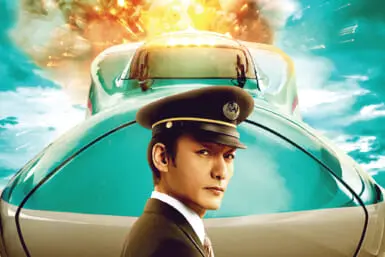One of my fondest childhood memories is sitting in our local cinema in suburban Germany, enjoying the so-called youth matinee. Every Sunday, kids could watch films their parents didn’t want them to watch at a discount. There I fell in love with the absolute finest that world cinema has to offer: bone-shattering martial-arts flicks from Hong Kong; blood-dripping Eurohorror from the friendly, sunny countries we visited on our family vacations; and, of course, Japanese films featuring giant monsters, also known as kaiju, although not to me until much later. These films, often carrying nonsensically localized titles (“King Kong’s Daughters Attack Frankenstein’s Monster Egg!”), may have been my first conscious encounter with anything coming from Japan. In the ’70s, nobody in Germany had heard the term sushi, and nobody cared where TV cartoons came from.
While I never became a superfan of the genre, let alone an expert or a completist, I have casually followed it into adulthood (my own adulthood; the genre, for better or worse, never quite grew up). Now, with Godzilla: King of the Monsters running wild on the big screen, I realize: maybe our casual relationship has come to an end. Maybe it is time to part ways with the monsters of my past. Something doesn’t feel right anymore. It hasn’t for a while.
Saying Goodbye to Godzilla
I have not seen the new film, and I am most likely not going to, which is precisely my point. No, there hasn’t been any petty fanboy drama; no red-faced, fist-shaking “How dare they?!” moment. There is just a complete lack of enthusiasm. Something I am apparently not alone with, but more on that later.
It was easy to say goodbye to Godzilla in 2004 when Godzilla: Final Wars was announced as his swan song. The film was a bloated mess, unconvincingly combining old-school creature silliness with modern superhero silliness. Still, it was more entertaining, though not always for the right reasons, than the mostly Godzilla-free 2014 revival. Denying Godzilla decent screen time in a film called Godzilla is not clever, meta or mature. It’s just childish and gimmicky. Granted: For a while, it can be strangely intriguing to watch great actors like Ken Watanabe and Sally Hawkins keeping straight faces amidst all the absurdity around them (true masters of their craft). Ultimately, however, it doesn’t carry over the two-hour-plus runtime that seems mandatory these days, even (or especially) for films that are nothing but blown-up B-pictures at heart (what happened to the good old 90 minutes?).
The Japanese revival, Shin Gojira, was even more of a debacle. It can be easily summed up with: “Boo-hoo, we can’t fight Godzilla because the outdated pacifist constitution that was forced on us by foreigners won’t allow us! If there only was a way to amend it!”
Some people thought of Shin Gojira as satire. They were wrong. It reminds me of how I once defended the film Independence Day against a refreshingly unpatriotic American friend. He didn’t like the film’s patriotic bombast. I said: “But that’s satire! They lay it on so thick, surely they must be joking.” He replied: “When it comes to patriotism, Americans never joke.” The same can be said for the Japanese.
The Aesthetic Dilemma
But it’s not just the isolated case of one bad movie. Or two. Or three. In a row. The kaiju genre is also in a more general, aesthetic dilemma. It can’t go back to rubber suits, model trains and cardboard cities (not even I want that). On the other hand, modern special effects just make it look feel, and sound like any modern special effects extravaganza. In one word: flavorless.
Franchises tend to do one of two things when they run out of steam, and Godzilla has tried them both (repeatedly): resort to over-populated monster-mash mayhem, or put formerly Earth-based characters into outer space. Space wasn’t the best choice for James Bond, Jason Voorhees or Leprechaun, and it didn’t work for Godzilla as evidenced by the recent dull, over-thought series of Netflix anime.
Universes Are Overrated
To make matters worse, Godzilla movies are not just Godzilla movies these days. They are also supposed to be ‘MonsterVerse’ movies.
Not only are functioning shared fictional universes hard to create. As concepts, they are also vastly unpopular. Marvel is not the rule, it’s the exception. One of the things Hollywood producers get wrong regularly is the assumption that people really, really care deeply about their creations. The truth is: most of them don’t. The few hardcore geeks who do won’t fill enough seats to make a big-budget production profitable. Most people just want to be entertained for two hours or three (seriously: what happened to 90 minutes?), then do something else. They don’t want to be immersed in ‘universes’; it’s too exhausting.
The reason why Hollywood has struggled for decades to produce successful sequels to the original Terminator and Predator films is not that the later sequels have been bad (they haven’t been great, but lack of greatness never kept any movie from becoming a blockbuster). The reason is that, deep down, nobody cares about Terminators and Predators. Back in the day, people cared about Arnie blowing stuff up. That was really all there was to it. Watching a recent Terminator film, I can hear the average movie goer’s desperate voice in my head: “SkyNet, Skynet… stop saying ‘SkyNet’! I don’t know what that is!”
Godzilla is losing touch in pretty much the same way, and it shows. The US box-office returns (admittedly not the world’s only commercial benchmark anymore) for the MonsterVerse films have been in constant decline, with King of the Monsters opening to little more than half the bucks Godzilla made in 2014. At this rate, it will soon be time for our old friend to go into one of his ‘hiatuses’ again. Maybe he should stay there for good. He will become a truly pleasant memory instead of a painful reminder that his time has truly passed.
So, in proper KonMari fashion, let’s politely greet the House of Kaiju and say: “Dear Godzilla, you sparked so much joy over so many years, and we thank you for that from the bottoms of our hearts. But today we have to bid you sayonara.”









